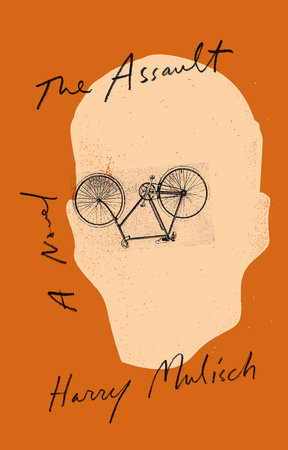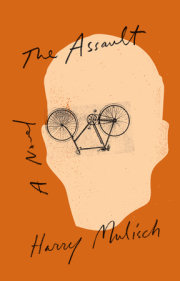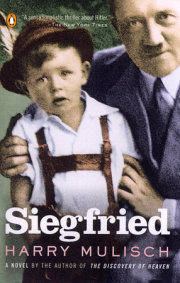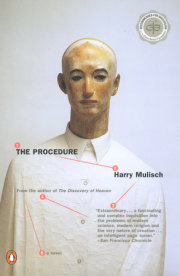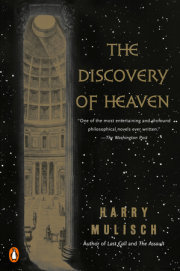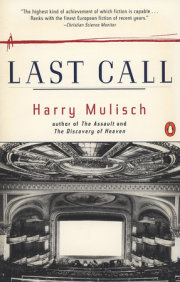PROLOGUE
Far, far back during the Second World War, a certain Anton Steenwijk lived with his parents and his brother on the outskirts of Haarlem. There four houses stood close together along a quay that bordered the water for about a hundred meters. After a gentle curve, the quay straightened out and became an ordinary street. Each house was surrounded by a garden and had a little balcony, bay windows, and a steep rood, giving it the air of a modest villa. The rooms on the top floor all had slanted wall. The houses were somewhat dilapidated and in need of paint, for their upkeep had already been neglected during the thirties. Harking back to lighter-hearted days, each bore a brave sign with its name: Hideaway, Carefree, Home at Last, Bide-a-Wee.
Anton lived in the second house from the left, the one with the thatched roof. If it had not already been called Carefree when the family rented it shortly before the War, his father would have preferred to name it something like Eleuthera, written in Greek letters. Even before the catastrophe occurred, Anton used to think that Carefree meant a place where cares entered freely, not a place free from cares; just as someone could think priceless meant without cost, rather than beyond price.
The Beumers, an ailing retired attorney and his wife, lived in Hideaway. Anton sometimes dropped in on them for a cup of tea and cake, in the days when there were still such things as tea and cake—that is to say, long before the beginning of this story, which is the story of an incident. Sometimes Mr. Beumer read him a chapter from
The Three Musketeers. Mr. Korteweg was the neighbor in Home at Last, on the other side of Anton’s house. Formerly a second mate in the merchant marine, he was out of work now because of the War. After the death of his wife, his daughter Karin, a nurse, had moved back home. Anton sometimes dropped in here also, through an opening in the backyard hedge. Karin was always friendly, but her father paid no attention to him.
There wasn’t much socializing on that quay. The most aloof neighbors of all were the Aartses, who had lived in Bide-a-Wee since the beginning of the War. It was said that he worked for an insurance company, though no one was really sure.
Apparently these four houses had been intended as the beginning of a new development, but nothing more came of it. They were surrounded by fallow fields overgrown with weeks and bushes, and even some tall trees. It was on these undeveloped lots that Anton spent most of his time, playing with other children from a neighborhood further away. Occasionally in the late twilight when his mother forgot to call him in, a fragrant still ness would rise and fill him with expectations—of what, he didn’t know. Something to do with later, when he’d grown up—things that would happen then. Something to do with the motionless earth, the leaves, two sparrows that suddenly twittered and scratched about. Life someday would be like those evenings when he had been forgotten, mysterious and endless.
The cobblestones on the road in front of the house were laid in a herringbone pattern. The street did not have a sidewalk. It petered out into a grassy bank that sloped gently down to the towpath, where it was pleasant to lie on one’s back. The wide canal’s uneven, winding bank showed that it had been a river at one time. Across the water stood a few farmhands’ cottages and small farms to the right, where the bank curved, was a windmill that never turned. Behind the farms, the meadows stretched out to the horizon. Still further lay Amsterdam. Before the War, his father had told him, one could see the glow of city lights reflected against the clouds. Anton had been there a few times, to the zoo and the Rijksmuseum, and to his uncle’s to spend the night.
Lying on the grassy bank and staring into the distance, he sometimes had to pull in his legs because a man who seemed to step out of another century came walking along the trampled towpath. The man had one end of a pole several yards long attached to his waist, while the other end was fastened to the prow of a barge. Walking with heavy steps, he pushed against the pole and thus moved the boat through the water. Usually a woman wearing an apron, her hair in a knot, stood at the wheel, and a child played on deck.
At other times the man remained on deck and walked forward along the side of the barge, dragging the ole behind him through the water. When he reached the bow, he planted the stick sideways in the bottom of the canal, grasped it firmly, and walked backwards, so that he pushed the boat forward beneath his feet. The specially pleased Anton: a man walking backwards to push something forward, while staying in the same place himself. There was something very strange about it, but it was his secret that he didn’t mention to anyone. Not till later, when he described it to his children, did he realize what primitive times he had witnessed. Only in movies about Africa and Asia could one still see such things.
Several times a day sailing barges, heavily laden ships with dark-brown sails, appeared silently around the first bend and, driven solemnly onward by the invisible wind, disappeared around the next.
The motorboats were different. Pitching, their prows would tear the water into a V shape that spread until it reached both sides of the canal. There the water would suddenly begin to lap up and down, even though the boat was already far away. Then the waves bounced back and formed an inverted V, which interfered with the original V, reached the opposite shore transformed, and bounced back again—until all across the water a complicated braiding of ripples developed which went on changing for several minutes, then finally smoothed out.
Each time, Anton tried to figure out exactly how this happened, but each time the pattern became so complex that he could no longer follow it.
Copyright © 1986 by Harry Mulisch. All rights reserved. No part of this excerpt may be reproduced or reprinted without permission in writing from the publisher.

